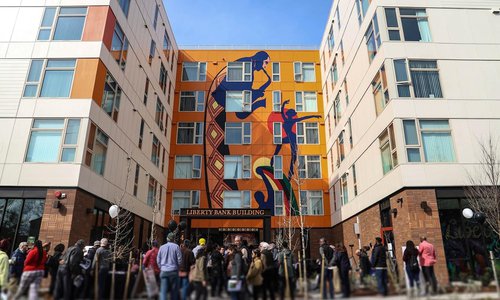Stories

For Our Children and Our Communities, A Black Mother's Call To Action
In the wake of the horrific shooting of Ralph Yarl, LISC's Holly Long asks readers of an opinion piece for The Kansas City Star to challenge the systemic issues that perpetuate violence that Black children and adults face every day. As a Black mother parenting children in the same city where the 16-year-old was shot, she poses the question: “When will a child’s innocent mistake no longer turn into a matter of life and death?”

Social Bonds and Racial Equity: The “S” Gains Prominence in ESG
The growth of the social bond market has offered a unique opportunity for nonprofit issuers, like Community Development Financial Institutions (CDFIs), to connect with retail and institutional investors and expand the flow of capital to justice-focused work. In ImpactAlpha this week, LISC’s Annie Donovan and Anna Smukowski take a closer look at this lasting shift in how investors view the “S” in ESG and what it means for CDFI efforts to invest in equity and inclusion throughout the U.S.

The Crucial Link Between Racial Equity and Equitable Lending
As Black History Month draws to a close, Connie Max, executive vice president of LISC Lending, examines how the time-worn structures of borrowing must change if we are ever to narrow the racial wealth gap and see our national economy truly flourish. Nothing less than authentic inclusion and full participation of all people will work—and LISC has some strategies for how to make that happen.

Investing Patient Capital in Established BIPOC Businesses to Close the Racial Wealth Gap
LISC’s George Ashton takes a close look at why growth in the pre-pandemic number of minority-owned businesses has failed to narrow the racial wealth gap. The answer: existing BIPOC businesses don’t have access to the kind of growth capital they need to build their resiliency, expand their workforce and support next-generation success. "By expanding access to growth capital, we can make our small business ecosystem more diverse and robust, matching appropriate financing to the needs of community-based businesses," he writes in a piece for Impact Alpha.

“Real Power is in the Land”: Community Land Trusts—Past, Present and Future
From their Southern roots in the Civil Rights movement to dynamic new efforts in diverse parts of the country, Community Land Trusts (CLTs) have proved to be a powerful means to combatting Black land loss and displacement, building community wealth, and strengthening community health and wellbeing. A recent LISC-led panel brought together leading CLT proponents to discuss the history of community land ownership in America, the rising movement today, and how CLTs are an imperative tool in the fight for economic, racial and environmental justice and equitable recovery from the pandemic.

Setting the Stage for an Equitable Small Business Recovery
Since the onset of the pandemic, LISC has equipped 16,000 small business owners with relief and resilience grants. But to foster opportunity and long-term resiliency for all entrepreneurs who confront entrenched inequities, including people of color, women, immigrants and refugees, and people with lower incomes and wealth, we need a robust universe of small business “ecosystems”: the network of capital, services, and supports that every enterprise needs to get on its feet and grow.